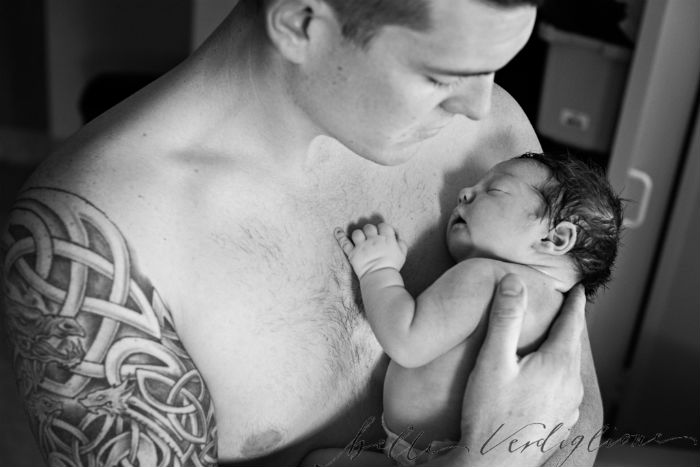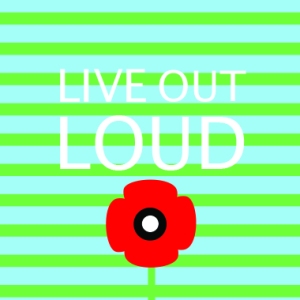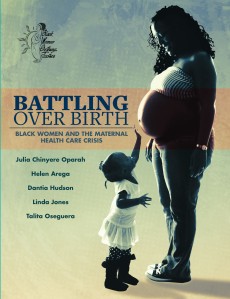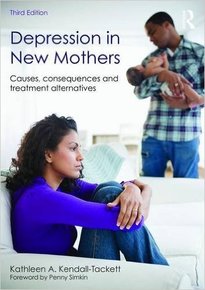Kathleen Kendall-Tackett, PhD, IBCLC, FAPA discusses how to make peace with a difficult birth experience.
Angela dreamed of a natural, unmedicated birth. She was managing her labor well when suddenly the cord prolapsed. Her dream birth ended in an emergency cesarean under general anesthesia. Both mother and baby survived, and Angela is grateful for that. But she feels deeply sad that she wasn’t awake to see her baby’s entry into the world.
Sheila planned a home birth with her family all around her. Her labor was progressing well until her midwife could not detect a fetal heart beat. Sheila was whisked to the hospital in an ambulance, and delivered a healthy baby boy. She was able to deliver vaginally, but the fear that surrounded her delivery still lingers. She keeps replaying these events over and over in her mind.
Monique was in labor for 23 hours. When things weren’t progressing, her labor was augmented with pitocin with no anesthesia. She was confined to her bed during her labor and in a lot of pain. When things still hadn’t progressed, her doctor decided on a cesarean section. In talking about her birth later, she was angry that no one helped with her pain, and everyone else made all the decisions for her.

Every birth is unique. And for some, a birth experience can be deeply troubling and even cause posttraumatic stress disorder. After giving birth, many women share a sense of disappointment, anger or fear. And this may have happened to you. Despite your best efforts, your birth did not turn out the way you planned. You may be angry. And you may think about your birth—a lot. Fortunately, if you have had a troubling, difficult, or traumatic birth, there are some positive steps you can take.
Good and bad births
What makes a birth experience difficult? Some births seem really bad to outside observers, and yet mothers feel positively about them. Other mothers have births that seem “perfect” on paper, yet they are deeply troubled. Some births are life-threatening and affect mothers for years.
What determines how a mother will feel? Researchers have previously defined “good” and “bad” birth experiences in terms of objective characteristics:
- length of labor
- use of pain medications
- medical interventions
- type of delivery.
 There is an assumption underlying much of the research on birth experiences that vaginal deliveries are usually positive, which is not always the case, and that cesareans are usually negative (also not always the case). When considering women’s reactions to their births, I have found it more useful to consider the subjective characteristics. Trauma psychologist Charles Figley describes these subjective aspects in his classic book Trauma and Its Wake. In looking at the range of traumatic events, he notes that an experience will be troubling to the extent that it is sudden, overwhelming and dangerous. Let’s examine these in relation to birth.
There is an assumption underlying much of the research on birth experiences that vaginal deliveries are usually positive, which is not always the case, and that cesareans are usually negative (also not always the case). When considering women’s reactions to their births, I have found it more useful to consider the subjective characteristics. Trauma psychologist Charles Figley describes these subjective aspects in his classic book Trauma and Its Wake. In looking at the range of traumatic events, he notes that an experience will be troubling to the extent that it is sudden, overwhelming and dangerous. Let’s examine these in relation to birth.
- Sudden: Did things happen quickly? Did your birth change from “fine” to dangerous in a short time? Did anyone have time to explain what was happening to you?
- Overwhelming: Did you feel swept away by the hospital routine? Were you physically restrained? Did you feel disconnected from what was happening? Did you have general anesthetic?
- Dangerous: Was your delivery a medical emergency? Did you have failed anesthesia? Did you develop a life-threatening complication? Was the baby in danger? Did you think you or your baby would die?
These three aspects can occur in vaginal or cesarean deliveries. In terms of understanding your reactions, the objective factors of your birth are less important than your subjective experience of it.
Some other risk factors for traumatic birth include your own history of depression, anxiety disorders, or trauma. Having a preterm baby can also be frightening and can lead to a negative reaction.
Relationships
Not surprisingly, your birth experience can impact your relationships with other people. You might be angry or disappointed that people who were there to support you during labor weren’t able to protect you. When you try to talk about your experience, others may not want you to. Kelly describes the reaction of her friends and family when she continued to be troubled about her birth.
Once you are past a certain number of months postpartum, people don’t want to talk about it any more. It’s like you have an ego problem or something. But I need to talk about it. It’s been too important of an experience for me not to talk about it. It’s changed my life.
Not being able to talk about your birth can compound your negative feelings. In the research literature on psychological trauma, this is known as “sanctuary trauma.” Sanctuary trauma occurs when a person has experienced a traumatic event and turns to those whom he or she usually counts on for support. Instead of offering support, these people either ignore or dismiss the issue, further contributing to a victim’s sense of isolation and trauma.
Unfortunately, a difficult birth can also influence another important relationship: your relationship with your baby. After your baby’s birth, you may have felt numb. Even weeks later, you may feel disconnected from your baby. This effect can be compounded if your baby had health problems and needed to stay in the hospital, away from you.
Breastfeeding

Breastfeeding may have also gotten off to a very rough start. The stress of your birth may have delayed when your milk “came in” by several days. You may have needed to supplement your baby with formula to get through this time. And if breastfeeding didn’t work out, for whatever reason, you may have experienced this as another significant loss—or even “failure.”
In our study of 6,410 new mothers, women who had any type of birth intervention were less likely to be exclusively breastfeeding. However, even after a very difficult beginning, exclusive breastfeeding is possible.
Fear and pain
Below, are two birth stories from a woman named Kathy. Each birth was difficult for different reasons. The subjective factors I described above are important themes in both stories. There is fear of dying, overwhelming pain, and feeling trapped. There was also a replaying of events after these births.
“When Peter was born, the birth itself was pain free. He was small, especially his head and shoulders, and it truly didn’t hurt at all. I kept insisting I wasn’t really in labor up until two minutes before he was born, when the doctor told me to lie down, shut up and push! He was born at 9:30, they told us he had Down syndrome at noon, and by 4 p.m., I was hemorrhaging so badly that I came within two minutes of death. I had to have an emergency D & C with no anesthesia (talk about PAIN!!) and a big blood transfusion.
That night, they told us Peter needed immediate surgery and had to go to a hospital in another city. A very traumatic day, to say the least. And then they sent me home the next day with no mention at all that I might want to talk to somebody about any of this—the Down syndrome, the near-death experience, nothing. I can still call up those memories with crystal clarity. And whenever we hear about another couple, I have to re-process those feelings. Interestingly, most of them relate to the hemorrhaging and D & C, not to the Down syndrome “news.” They’re all tied up together. Maybe it’s good to remind myself every so often of how precious life is.
My third birth was excruciatingly painful—baby was 9 lb 3 ounces, with severe shoulder dystocia—his head was delivered 20 minutes before his shoulders. I had some Stadol in the IV line right before transition, but that’s all the pain relief I had. I thought I was going to die, and lost all perspective on the fact that I was having a baby. I just tried to live through each contraction. Of course, I was flat on my back, with my feet up in stirrups, and watching the fetal monitor as I charted each contraction—I think those things should be outlawed! I know now that if I had been squatting, or on my hands and knees, I probably could have gotten him out much easier. I’m the one who has the giant shoulders and incredibly long arms, so I can’t blame anyone else for my two babies with broad shoulders.
That night, after Alex was born (at 9 in the morning), I could not sleep at all because every time I tried to go to sleep, my brain would start re-running the tape of labor, and I would feel the pain and the fright and the fears of dying all over again. I stayed up all that night and the next day, and didn’t sleep until I was home in my own bed.”
In Kathy’s stories, we see some classic symptoms of a posttraumatic stress response:
- the fear of dying
- the re-experiencing of her birth
- the sleeplessness.
She did eventually come to a place of peace over her experiences, but the memories of those two births have remained vivid.
What you can do
If you had a difficult birth experience, you cannot change that. There are, however, a number of positive steps that you can take to help you resolve your experience and heal from it. Here are some things that other mothers have found helpful. Keep in mind that coming to terms with a negative birth experience is a process that can take months. Don’t be discouraged if it doesn’t happen overnight. You can overcome this.
Process your experience
You may find it helpful to contact one of the support organizations to talk to someone who can validate your feelings and help you come to terms with your experience. Peer support, in person or online, can also be helpful. Some women find short-term therapy helpful. Another option is to write about your experience. Some find that writing in a journal is very therapeutic, and they’re not imagining this effect. Researchers have found that writing can help you heal from trauma. If you’d like to try it, I’d encourage you to get the book, Writing to Heal, to get the most out of this activity.
Learn as much as you can about your experience
I always encourage mothers to get copies of their medical records. If possible, talk with your health care provider or someone else who can help you understand the events that occurred during your birth. It is also helpful to read books that might put your birth experience in a broader perspective. Reading will do much to validate your experience, and help you understand it. You may still be angry (or you may get angry for the first time). But eventually the experience will not dominate your thoughts. If you plan to have another baby, the information you gain during this stage will make you a wiser consumer.
Give yourself time to get to know your baby
Your baby’s entry into the world was far from ideal. You may feel disconnected from her. Some mothers report that their baby doesn’t feel like their own. Fortunately, you can do something about this. Spend as much time as you can with your baby skin-to-skin, if it doesn’t feel too overwhelming. If skin-to-skin contact feels like too much (as it can sometimes following trauma), ease into it gradually. You can get a lot of the same effects if you and your baby are lightly clothed.
You might also try infant massage. That can be a great way to get to know your baby and start to feel connected to each other. Babywearing is another helpful strategy.
Breastfeeding is possible

Following a traumatic birth, breastfeeding can also be difficult. Holding your baby skin-to-skin, or in light clothing, can also reactivate your baby’s feeding instincts and help your baby find and latch onto the breast, sometimes even weeks after birth. That reconnection can be healing for both of you. But mostly, you need to see that your baby prefers you to all others, even if, at the moment, you are having problems learning to breastfeed.
Get as much help and support as you can. Your stress hormone levels are likely high. Any activity you can do to bring them down will help. So accept all offers of household help. Relax as much as you can. Do things you enjoy. And spend as much time as you can with your baby. The two of you have been through a lot.
If your milk production is delayed by a few days, you may need to briefly supplement. This can be really disappointing. But remember, this is a short-term strategy to get breastfeeding back on track. Things really will get easier.
Realize your partner may have also been traumatized
 A negative birth experience can create problems between you and your partner.
A negative birth experience can create problems between you and your partner.
Like you, your partner may have felt powerless and swept away by the experience.
Your partner might feel guilty because he or she could not protect you, and react to his or her bad feelings by being angry with you. Because of those negative feelings, your partner may be unable to offer you emotional support. In this case, the most effective thing you can do is to be honest about your feelings with one another and try to find outside support together. If, however, your partner is not willing to work with you to resolve your birth experience, you must seek help alone.
Resist the temptation to rush into another pregnancy just to do it “right”
I often meet mothers who were unhappy with their birth experiences, who quickly become pregnant again in order to make it a better experience “this time.” You need some time in order to put your experience into perspective, get to know the baby you already have, and physically recover. Adding another pregnancy to the equation makes things much more complicated, and may not give you sufficient time to consider all of your options.
Resist making hasty decisions about not becoming pregnant again
This is not the time to make a decision about permanent birth control. Some women make this decision only to regret it later. Understandably, you never want to repeat what you’ve been through. However, it is much better to make a deliberate decision rather than simply immediately reacting to a negative birth experience.
Make a conscious effort to forgive yourself
At first you might balk at this suggestion. “I have nothing to forgive myself about.” If you still feel this way after you’ve thought about it, great! However, I’ve talked with many women who blame themselves, and feel like they somehow failed. “If only I had been stronger…” “If only I had checked out the doctor/hospital more carefully….” “If only I had gone to a different prenatal class…” The “if only’s” are endless. Recognize that you did the best you could under the circumstances and with the knowledge you had at the time, and let yourself off the hook!
Recognize that birth is only the beginning of a life-long relationship with your baby

Motherhood is a role you gradually grow in to. A difficult beginning does not need to be the blueprint for the rest of your mothering career. It is important to realize that a negative birth experience can affect your relationship with your baby, but it does not have to. This is why it is vital for you to get the support you need as soon as possible. I have seen mothers who have had difficult births try to make up for it by being “Super-mom”—to everyone’s detriment. It is difficult for anyone (even Super-mom) to be responsive and giving toward an infant or child when she is hurting inside.
Road to recovery
For Angela, recovery took a couple of years. Fortunately, she has a great relationship with her doctor and was able to talk through some of her concerns with him. It was also helpful when she found another mother who had had a cesarean section while under general anesthesia. Just having someone else who had had a similar experience made her not feel so alone.
Sheila’s recovery took about a year. She had a supportive midwife and family members who were there when she was taken away by the ambulance. Sheila also found that writing about her experience was healing.
For Monique, recovery was a long process because her birth experience brought up some issues from her past, and issues she and her husband had between them. But there were many bright spots along the way. Monique had completely stopped breastfeeding in the hospital because there had been so much to cope with all at once. But she was able to start breastfeeding again when her baby was three months old and breastfed for a year.
In conclusion, I would encourage you to take good care of yourself and actively search for support. Many mothers and babies have overcome difficult beginnings. I am confident that you can, too.
GOLD interview on birth trauma talk
How birth trauma impacts breastfeeding
Birth trauma and childbirth-related PTSD
Risk factors for traumatic childbirth
Photo with title: Esther Edith Spokane Birth Photographer
Kathleen Kendall-Tackett, PhD, IBCLC, FAPA
 Dr. Kendall-Tackett is a health psychologist and International Board Certified Lactation Consultant, and the owner and Editor-in-Chief of Praeclarus Press, a small press specializing in women’s health. She is Editor-in-Chief of two peer-reviewed journals: Clinical Lactation and Psychological Trauma. She is Fellow of the American Psychological Association in Health and Trauma Psychology, Past President of the APA Division of Trauma Psychology, and a member of the Board for the Advancement of Psychology in the Public Interest. Dr. Kendall-Tackett specializes in women’s-health research including breastfeeding, depression, trauma, and health psychology, and has won many awards for her work including the 2016 Outstanding Service to the Field of Trauma Psychology from the American Psychological Association’s Division 56.
Dr. Kendall-Tackett is a health psychologist and International Board Certified Lactation Consultant, and the owner and Editor-in-Chief of Praeclarus Press, a small press specializing in women’s health. She is Editor-in-Chief of two peer-reviewed journals: Clinical Lactation and Psychological Trauma. She is Fellow of the American Psychological Association in Health and Trauma Psychology, Past President of the APA Division of Trauma Psychology, and a member of the Board for the Advancement of Psychology in the Public Interest. Dr. Kendall-Tackett specializes in women’s-health research including breastfeeding, depression, trauma, and health psychology, and has won many awards for her work including the 2016 Outstanding Service to the Field of Trauma Psychology from the American Psychological Association’s Division 56.
Dr. Kendall-Tackett has authored more than 400 articles or chapters, and has just completed her 35th book, The Phantom of the Opera: A Social History of the World’s Most Popular Musical. Her most recent books include: Depression in New Mothers, 3rd Edition (2016, Routledge UK, in press), Women’s Mental Health Across the Lifespan(2016, Routledge US, in press, with Lesia Ruglass), Psychology of Trauma 101 (2015, Springer, with Lesia Ruglass) and The Science of Mother-Infant Sleep (2014, Praeclarus, with Wendy Middlemiss). Her websites are:























November 9, 2017 at 12:22 pm
This makes me so sad .Studies show women who have doulas are significantly less likely to view their birth as negative.Having a doula helps withe the “powerlessness” a couple can feel during their birth. Doulas should be part of the standard maternity care. Laura DePasquale, CD(DONA)
LikeLike